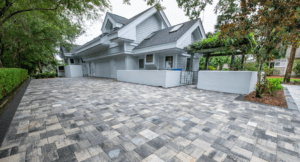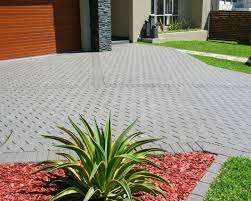Maintaining the cleanliness and appearance of your paver is essential to ensure its longevity and preserve its overall appeal. With the myriad of cleaning tips available, it can be overwhelming to determine the best approach.
However, fear not, as we have compiled a list of the top 10 cleaning tips that will make your paver shine like new. From clearing debris to tackling stubborn stains, we have you covered.
So, without further ado, let’s explore these expert-approved tips that will transform your paver into a pristine masterpiece.
Clearing Debris
To effectively clean your paver, it is essential to begin by clearing away any debris that may have accumulated on its surface. This step is crucial for maintaining the appearance and longevity of your paver.
Debris such as leaves, dirt, and twigs can trap moisture and lead to the growth of mold and algae, causing the paver to become slippery and unsafe. Additionally, debris can also contribute to the formation of oil stains, making it even more challenging to clean the surface.
To prevent oil stains and ensure effective debris removal, start by sweeping the paver with a stiff broom or using a leaf blower. This will help dislodge any loose debris and make it easier to proceed with the cleaning process.
Sweeping Regularly
Regularly sweeping your paver is an essential maintenance task that helps to remove dirt, debris, and other potential hazards, ensuring its long-term durability and safety. Sweeping regularly not only keeps your paver looking clean and attractive but also prevents the build-up of dirt and debris that can cause damage over time.
It is recommended to use a broom with stiff bristles to effectively remove loose particles from the surface. For larger areas, a push broom or a mechanical sweeper can be used to speed up the process. Regular sweeping also helps to prevent the growth of weeds and moss, which can cause the paver to become uneven and unstable.
Pressure Washing Technique
When using a pressure washer to clean your paver, it is important to consider two key factors: proper nozzle selection and correct pressure setting.
The nozzle you choose will depend on the type of surface and the level of cleaning required.
Additionally, adjusting the pressure setting to an appropriate level will ensure effective cleaning without causing any damage to the paver.
Proper Nozzle Selection
Using the appropriate nozzle is essential for achieving optimal results when pressure washing your paver. Proper nozzle selection allows for efficient cleaning and prevents damage to the surface.
To ensure the longevity of your nozzle, regular maintenance is necessary. Inspect the nozzle for any clogs or debris, and clean it thoroughly before each use.
Additionally, adjust the water pressure according to the type of paver and the level of dirt or grime. Higher pressure may be required for tougher stains, while lower pressure should be used for delicate surfaces.


Correct Pressure Setting
To achieve the best results when pressure washing your paver, it is crucial to determine the correct pressure setting for the task at hand. Using the correct pressure washing tools and techniques will help you avoid damaging your paver surface.
The pressure setting on your pressure washer should be adjusted according to the type of paver and the level of dirt or stains you need to remove. It is important to start with a lower pressure setting and gradually increase if necessary. Using too high of a pressure can lead to paver surface erosion or damage.
Additionally, be mindful of the distance between the nozzle and the paver surface to prevent any unnecessary harm. By using the correct pressure setting and exercising caution, you can effectively clean your paver without causing any damage.
Removing Oil Stains
When it comes to removing oil stains from your paver, there are several techniques you can try. Common household remedies such as baking soda, dish soap, or vinegar can be effective in lifting the stains.
However, for stubborn or large oil stains, it may be best to seek professional cleaning services to ensure thorough removal.
Oil Stain Removal Techniques
Effective methods for removing oil stains from your paver include utilizing specialized cleaning agents, implementing absorbent materials, and employing high-pressure washing techniques.
When it comes to oil stain removal techniques, using vinegar for deep cleaning is a popular choice. Vinegar is known for its versatility and effectiveness in removing tough stains, including oil.
To use vinegar for oil stain removal, start by diluting it with water in a 1:1 ratio. Then, apply the vinegar solution directly onto the stained area and let it sit for a few minutes.
Scrub the stain gently using a brush or sponge, and rinse the area thoroughly with water. Vinegar’s acidic properties help break down and dissolve the oil, leaving your paver clean and stain-free.
Common Household Remedies
One solution for removing oil stains from your paver is to utilize common household remedies. These DIY solutions can be effective in tackling stubborn oil stains without the need for expensive commercial cleaners.
Here are some vinegar uses and other household remedies that can help you get rid of oil stains:
- Vinegar and water mixture: Create a solution by mixing equal parts of vinegar and water. Apply it directly to the oil stain and scrub gently with a brush. Rinse thoroughly with water.
- Baking soda paste: Make a paste by combining baking soda with water. Apply it to the oil stain and let it sit for a few hours. Scrub the area with a brush and rinse off.
Professional Cleaning Services
Professional cleaning services are a reliable and efficient option for effectively removing oil stains from your paver. These services employ professional cleaning techniques that are specifically designed to tackle tough stains, such as oil spills. By hiring professionals, you can benefit from their expertise and experience in dealing with various types of stains and surfaces.
One of the main benefits of professional cleaning is the use of specialized equipment and cleaning solutions. Professionals have access to high-quality tools and products that are specifically formulated to remove oil stains without causing any damage to the paver. They know the right techniques to apply and can ensure thorough cleaning, leaving your paver looking as good as new.
Moreover, professional cleaning services can save you time and effort. Cleaning oil stains can be a time-consuming and labor-intensive task, especially if you don’t have the right tools and knowledge. By hiring professionals, you can sit back and relax while they take care of the cleaning process for you.
Tackling Mold and Mildew
To effectively combat mold and mildew on your paver, follow these professional cleaning tips:
- Use bleach for mold removal:
- Dilute bleach with water in a 1:10 ratio.
- Scrub the affected areas with a brush soaked in the bleach solution.
- Rinse thoroughly with water to remove any residue.
Prevent mold and mildew growth:
- Keep the paver clean and free of debris.
- Ensure proper drainage to prevent standing water.
- Trim nearby vegetation to allow sunlight and airflow.
- Use a mold and mildew inhibitor regularly to prevent future growth.
Using Vinegar for Deep Cleaning
After effectively tackling mold and mildew on your paver, the next step in deep cleaning involves utilizing vinegar as a powerful cleaning agent.
Vinegar has numerous applications when it comes to cleaning pavers. Its acidic nature makes it effective at removing dirt, grime, and stains. One of the main benefits of using vinegar is that it is an environmentally friendly alternative to harsh chemical cleaners. It is non-toxic and safe to use around pets and children.
To use vinegar for deep cleaning, simply mix equal parts of vinegar and water in a spray bottle and apply it to the paver. Let it sit for a few minutes before scrubbing with a brush or sponge. Rinse thoroughly with water to remove any residue.
Vinegar can also be used to prevent weed growth between pavers by spraying it directly onto the weeds.
Preventing Weed Growth
Preventing weed growth is essential in maintaining the cleanliness and appearance of your pavers.
There are various methods you can employ to prevent weeds from taking root.
One method is using weed barriers, which can be placed underneath the pavers during installation to block weed growth.
Another method is applying natural weed control solutions, such as vinegar or boiling water, directly on the weeds to kill them.
Regularly maintaining weed-free pavers is also important. This can be done by pulling out any weeds that do manage to grow, sweeping or blowing away any debris that could encourage weed growth, and regularly applying a weed killer or herbicide.
Weed Prevention Methods
Implementing effective methods to prevent weed growth is essential for maintaining the beauty and longevity of your paver. By employing the right techniques, you can keep those pesky weeds at bay and enjoy a weed-free paver for years to come.
Here are some organic weed control methods you can try:
- Mulching: Apply a layer of organic mulch around your paver to suppress weed growth. This will also help retain moisture and regulate soil temperature.
- Vinegar solution: Mix equal parts of vinegar and water in a spray bottle and apply directly to the weeds. Vinegar acts as a natural herbicide, killing weeds without harming the environment.
These weed prevention techniques are both effective and environmentally friendly, ensuring that your paver remains weed-free without the use of harmful chemicals.
Natural Weed Control
To effectively maintain a weed-free paver, it is crucial to implement natural methods that prevent weed growth and preserve the aesthetic appeal of your outdoor space.
There are several effective weed control methods that are organic and safe for the environment.
One option is to manually remove weeds by pulling them out from the roots. This method requires regular maintenance but is effective in preventing weed growth.
Another natural weed control method is to use organic weed killers, which are made from natural ingredients such as vinegar, salt, or boiling water. These organic weed killers are effective in killing weeds without harming the surrounding plants or the environment.
Maintaining Weed-Free Pavers
Maintaining weed-free pavers requires consistent and effective weed control methods. To prevent weed growth and keep your pavers looking pristine, consider the following natural weed control techniques:
- Regular maintenance:
- Sweep and remove debris from the pavers regularly to prevent weed seeds from settling.
- Pull out any visible weeds as soon as they appear, ensuring you remove the roots to prevent regrowth.
- Organic weed prevention:
- Apply a layer of organic mulch or landscape fabric between the pavers to block sunlight and inhibit weed growth.
- Use natural weed-killing solutions such as vinegar or boiling water to kill weeds without harmful chemicals.
Sealing Your Pavers
Applying a protective sealant to your pavers is essential for preserving their longevity and enhancing their appearance. Sealing benefits include preventing stains from oil, dirt, and other substances, as well as reducing weed growth and inhibiting the growth of moss and algae.
The application process involves a few simple steps. First, ensure that the pavers are clean and dry. Next, choose a high-quality sealant that is suitable for your specific Type of Pavers. Apply the sealant using a brush or sprayer, making sure to cover the entire surface evenly.
Allow the sealant to dry completely before allowing foot traffic or placing any objects on the pavers. It is recommended to reapply the sealant every few years to maintain its effectiveness. Sealing your pavers not only protects them but also enhances their overall aesthetic appeal.
Repairing Cracks and Damage
After ensuring that your pavers are properly sealed, it is important to address any cracks or damage that may have occurred. Repairing cracks and damage promptly not only enhances the appearance of your pavers but also prevents further deterioration. Here are some effective methods for repairing cracks and preventing damage:
- Crack Repair
- Fill small cracks with a concrete crack filler or polymeric sand.
- For larger cracks, remove the damaged pavers and replace them with new ones.
- Damage Prevention
- Regularly inspect your pavers for signs of wear and tear.
- Clean your pavers regularly to remove debris and prevent staining.
- Avoid using sharp objects or heavy machinery on the pavers to prevent damage.
Maintaining Your Pavers for Longevity
To ensure the longevity of your pavers, it is crucial to implement a regular maintenance routine.
Preventing discoloration and enhancing paver color are essential aspects of maintaining your pavers. One effective way to prevent discoloration is by regularly sweeping and removing debris from the surface of the pavers. This helps to prevent the accumulation of dirt and stains that can cause discoloration over time.
Additionally, sealing your pavers can help to protect them from the elements and prevent fading or color loss. It is recommended to apply a high-quality sealant every 2-3 years or as needed.
Finally, it is important to address any repairs or damage promptly to prevent further deterioration and maintain the overall integrity of your pavers. Read our Blog on Pros and Cons for Driveway Paver.
Conclusion
By following these top 10 cleaning tips for your pavers, you can ensure their longevity and maintain their aesthetic appeal.
Regular sweeping, pressure washing, and sealing can prevent dirt, debris, and stains from damaging your pavers.
Additionally, addressing issues such as oil stains, mold, mildew, and weed growth promptly can help preserve the integrity of your pavers.
By taking these proactive measures, you can enjoy clean and well-maintained pavers for years to come.
